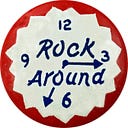Member-only story
Top 11 Songs From ‘The Many Saints of Newark’
Like ‘The Sopranos,’ the prequel is an audio journey back in time

“I listen to a lot of music all the time… A lot of these things are dredged up from memory. I’ll go, ‘Oh, that was a really good song.’ Or I’ve kept this catalog in my head of so-and-so I’ve always wanted to use. And then a movie situation will come up in which they fit very well.”
– David Chase, writer and producer of The Sopranos
The Many Saints of Newark, directed by Alan Taylor and written by David Chase and Lawrence Konner, is the prequel to the hit TV series The Sopranos. Set in Newark, New Jersey in the 1960s and ’70s, Michael Gandolfini plays the young Tony Soprano, the part played by his father, the late James Gandolfini, in The Sopranos.
Like the series, the film makes generous use of period music of the day. Screenrant describes the scenes where each song is heard in the film.
11. “Sway” by the Rolling Stones
One of the reasons guitarist Mick Taylor left the Rolling Stones in 1974 after five years was because he felt he did not receive credit for his contributions to songs. Two of his best efforts were “Moonlight Mile” and “Sway” from the 1971 LP Sticky Fingers. “Let’s put it this way — without my contribution those songs would not have existed,” Taylor told The Guardian. “There’s not many but enough, things like ‘Sway’ and ‘Moonlight Mile’ on Sticky Fingers and a couple of others… Mick had promised to give me some credit for some of the songs–and he didn’t.”
“Sway” was recorded during one of Keith Richards’ absences; Richards contributed vocals but no guitar solos. Taylor plays a bottleneck slide guitar during the bridge and an outro solo that is considered some of his best work. “I added my solo to ‘Sway,’ but it’s very much Mick’s song.” Taylor notes in Songfacts. “I don’t think Keith’s on it. It had a great, loose feel. Mick played rhythm guitar on that. He’s a great rhythm player. My theory is he has a natural feel and that’s also why he’s such a great dancer.”
10. “The Revolution Will Not Be Televised” by Gil Scott-Heron
Gil Scott-Heron has been called “the Godfather of Rap” because of his 1970 spoken-word release “The…
